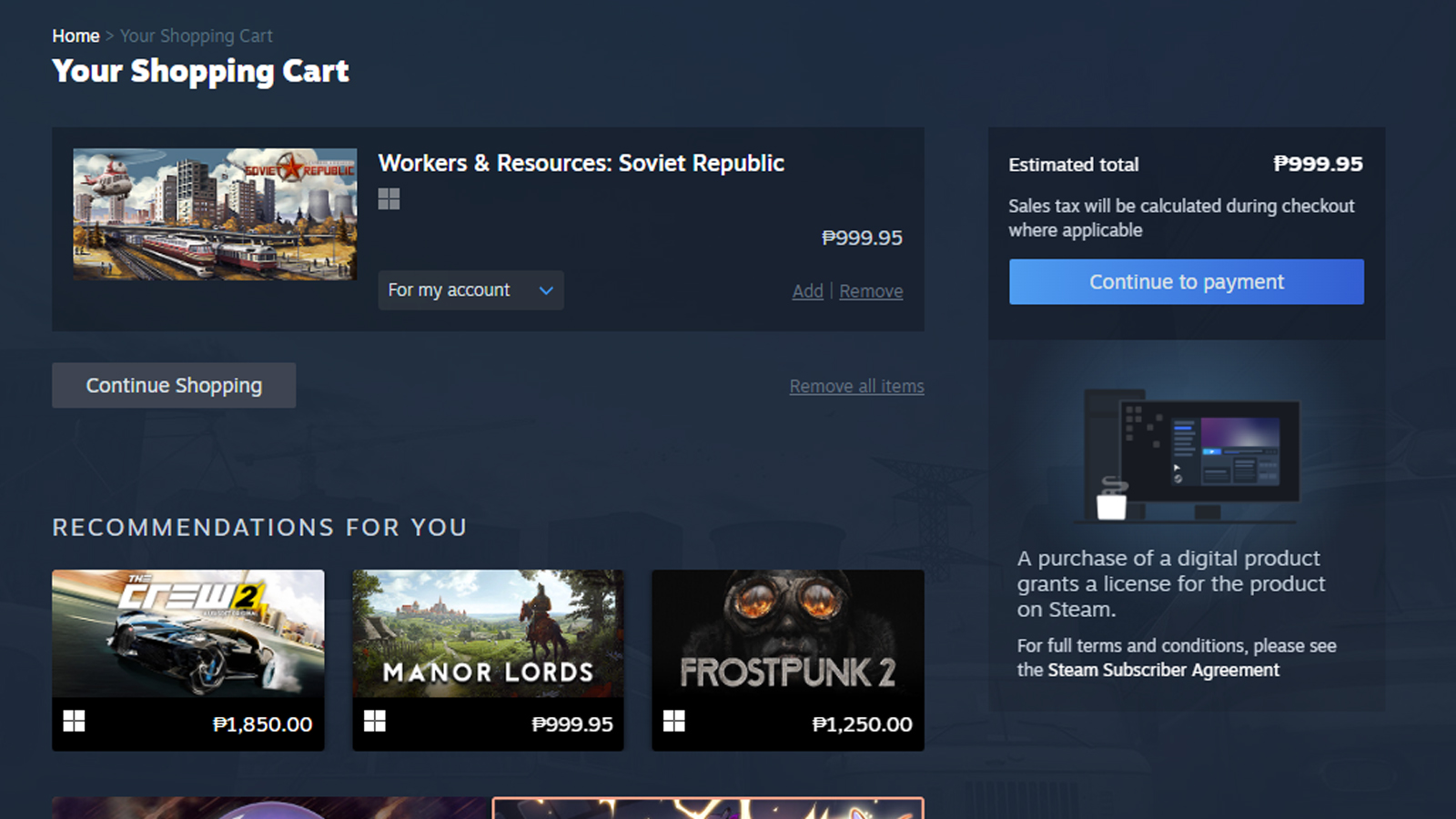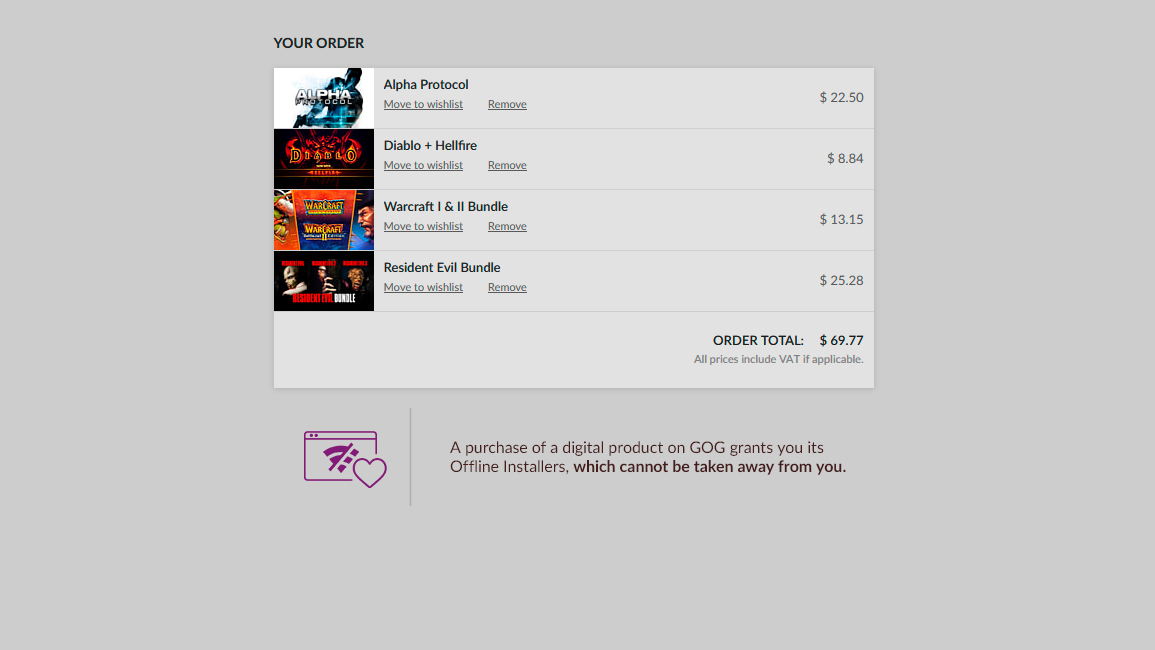Steam checkout banner clarifies you don’t own the game you buy — GOG takes a jab at Steam, saying it gives users offline installers that cannot be taken away
That massive Steam library isn't actually yours.

Steam updated its shopping cart page with a banner under the ‘Continue to Payment’ button that says you only get a license for the game you’re buying. According to a Reddit Thread that discussed this change, the company made this change apparently due to a new California law. AB 2426 states that a seller of digital goods cannot use “the terms buy, purchase, or any other term which a reasonable person would understand to confer an unrestricted ownership interest in the digital good.” Furthermore, it says sellers must provide consumers with “a clear and conspicuous statement” when purchasing.
Since Steam only sells licenses to the games on its platform and not permanent ownership, it must implement this change to avoid legal trouble in California. Because of this, it added this small banner on the ‘Your Shopping Cart’ page, which says, “A purchase of a digital product grants a license for the product on Steam.”
It means you do not own the game you bought on the Steam platform; you’re only granted a license to use it on your device. Steam clearly states on the Steam Subscriber Agreement page that games purchased through the platform are licensed. The difference is that Steam must make it visible to the consumer with AB 2426, not buried under the Steam Subscriber Agreement page that most users do not read.
Meanwhile, GOG took the opportunity to take a jab at Steam on X, teasing, "Since checkout banners are trending, we're thinking of putting one up ourselves. Thoughts on this one?" The banner says, "A purchase of a digital product on GOG grants you its Offline Installers, which cannot be taken away from you.”

Steam is currently the biggest PC game platform in the world, so it has a massive impact on the gaming industry. Its use of licenses instead of outright ownership thus means that most PC gamers do not own their favorite titles. Instead, they’re just granted the right to use them, but the game developer retains the right to control and do as they please with the game.
If a developer takes a title you bought via Steam off the platform, the game will also be removed from your library. Thankfully, Steam does not uninstall a game that is already on your computer. However, it still doesn’t sit well with many players that you don’t have complete and absolute control of your Steam game library, which contains titles you’ve already bought.
On the other hand, once a game you bought on GOG enters your library, it will stay there for life (or as long as GOG is in business). This means that even if the game developer removes a title from the platform, it will not be removed from your account if you’ve already purchased it.
Get Tom's Hardware's best news and in-depth reviews, straight to your inbox.
Licensing vs. purchasing games has always been a contentious issue between gamers, distributors, and developers. And while we’re slowly losing the meaning of ownership in the age of digital libraries and subscriptions, it’s still nice to know that there are some holdouts that, when they sell something to you, mean that you get to keep that thing you bought forever.

Jowi Morales is a tech enthusiast with years of experience working in the industry. He’s been writing with several tech publications since 2021, where he’s been interested in tech hardware and consumer electronics.
-
ezst036 Not a surprise. Software licensing has always been just licensing, not ownership.Reply
And actual ownership ended when cartridges and CDROMS/DVD went away due to lack of customer demand. Even in those days it wasn't quite full ownership but it was a little more substantial.
This was a choice gamers themselves made. If they want to lay blame somewhere, I'm sure their houses have mirrors in them somewhere. -
coolitic Reply
I'm pretty sure even "physical-copies" of games were also just licenses. And it's also the same w/ GOG, in the sense that you have a license to *play* the game, and not, for example, own the art-assets inside.ezst036 said:Not a surprise. Software licensing has always been just licensing, not ownership.
And actual ownership ended when cartridges and CDROMS/DVD went away due to lack of customer demand. Even in those days it wasn't quite full ownership but it was a little more substantial.
This was a choice gamers themselves made. If they want to lay blame somewhere, I'm sure their houses have mirrors in them somewhere. -
Sluggotg GOG is my favorite! The vast majority of my digital game purchases are through them. Make sure to download the local installers. Make back ups and boom, you have your games safe and sound.Reply
If some game developer pulled a game off Steam that I had purchased, I would expect a full refund. I would also NEVER buy another game from that developer. -
FunSurfer In the PC Gamer site they wrote about this subject: "You can't bequeath your Steam library to anyone upon your unfortunate passing either, which of course you would be able to if you really owned its contents."Reply
But you can bequeath your Steam account password. -
AkroZ Reply
The law of most Member States of the European Union expressly or implicitly recognises that digital assets are part of a person's estate and can be inherited by their beneficiaries.FunSurfer said:In the PC Gamer site they wrote about this subject: "You can't bequeath your Steam library to anyone upon your unfortunate passing either, which of course you would be able to if you really owned its contents."
But you can bequeath your Steam account password. -
Jito463 ReplyIf a developer takes a title you bought via Steam off the platform, the game will also be removed from your library.
That's not really accurate. Back when EA was distancing themselves from Steam, they pulled Dragon Age II from the store, but it remained in my account. There may be specific instances of that happening, but it's definitely not in all cases. -
Alvar "Miles" Udell Could be worse, remember the days before Steam when some DRM methods literally took away your ability to play a physically purchased game without recourse if you had to reinstall it a couple of times, such as after a HD failure, without deactivating it first? My Command & Conquer 3 disks became frisbees because of that. Or what about games that were rendered unplayable (without somewhat "illegal" means) because the physical disk was damaged even if all the disk was used for was DRM purposes?Reply -
redgarl I will from now on buy my games on GOG if they are available there.Reply
You cannot just remove the access right of your customers just like that for any reasons.
Even if it is a license, you should have the right to sell that license to whomever. There should be no difference between a physical copy and the digital one that you are purchasing. -
DavidLejdar And I never really gave Valve money, just a license to use it, until I want it back, in form of Nvidia stock, at a price of the time I borrowed Valve this or that amount of money. Harhar :DReply
A few instances actually. It revolved around publisher having sold Steam-generated keys offsite, a batch-purchase having allegedly happened with stolen CC (to then be sold on a reseller site), and publisher revoking these keys in particular (as in the game not being in user's library anymore).HopefulToad said:If anyone knows of a single instance of a game being retroactively removed from customers' digital libraries that wasn't an online-only game that no longer worked anyway (i.e. The Crew), I would be very interested to learn of it.
But yeah, when a game gets removed from the store, it generally doesn't get removed from the library. I have a few of these delisted games still in my library, i.e. Poker Night at the Inventory, 8-Bit Bayonetta, Spec Ops: The Line and DiRT 3 and 4. -
luckzeh ReplyIf a developer takes a title you bought via Steam off the platform, the game will also be removed from your library.
Much like you're an authority on tech and video games, I'm an authority on dinosaurs now:
Dinosaurs are green. When a dinosaur dies, it turns into bones. Dinosaurs don't usually speak the same language as me.
I mean, do you just not fact-check anything, or is this hallucinated up by some GPT to begin with? The structure of those two paragraphs (Steam does this, GOG does that) looks very GPT-ish.
Technically there are several possible ways that developers can render a game any of: unplayable, inaccessible, undownloadable, unowned. But they're all so far-out that it happens with <1% of game removals.HopefulToad said:As far as I'm aware, developers cannot ever electively remove games from a user's library after they have been bought. See the Steamworks documentation. Once you buy it, you own the license perpetually. <....> If anyone knows of a single instance of a game being retroactively removed from customers' digital libraries that wasn't an online-only game that no longer worked anyway (i.e. The Crew), I would be very interested to learn of it.
Since you asked for details:
- Obviously, a developer can shut down online servers (and update the game to state this, or leave it abandoned & failing to connect). This of course happens frequently as products are abandoned.
- A developer can update their game to replace the game files with nothing (but someone who "owns" the game can still use advanced tools to download an older build). I would hazard a guess that this is the most common way of defacing your own title, along with deleting the contents of the store page before taking it down. Sometimes developers are ashamed of a product from years back and want their name erased from it, that kind of thinking.
- A developer can remove the game files from the license entirely, and then the user can't download anything at all anymore. This is the most bothersome type of expropriation, but also incredibly rare.
- A developer can revoke all Steam keys they handed out, even years after the fact. From time to time, they do this entirely by mistake, but fortunately lately Valve has been willing to restore these to affected users: most recently, "City of Beats" accidentally killed legitimately sold keys, and the game was restored to users in a matter of hours.
- A developer can ask Steam to forcefully refund all store purchases (potentially for a specific time range or a region) – which is again very rare, but does happen in practice when big publishers accidentally make a long-delisted game available for purchase again, or when a moderately sized company accidentally sells their product for next to nothing and wakes up with regret the next morning. Of course, if you do get your money back you're not technically getting robbed of anything.
- Sometimes, an AAA publisher gets to turn your game into something else – for example, the original Grand Theft Auto IV and its stand-alone expansion GTA Episodes From Liberty City used to be two different Steam games that used Games For Windows Live, and when Rockstar relaunched the game as Grand Theft Auto IV: The Complete Edition they removed those two games from users' libraries entirely and instead gave them the new version. As common with GTA re-releases, this also lead to the loss of a big chunk of the game's soundtrack, though of course that can be modded back in – dunno how legal it is to do so.